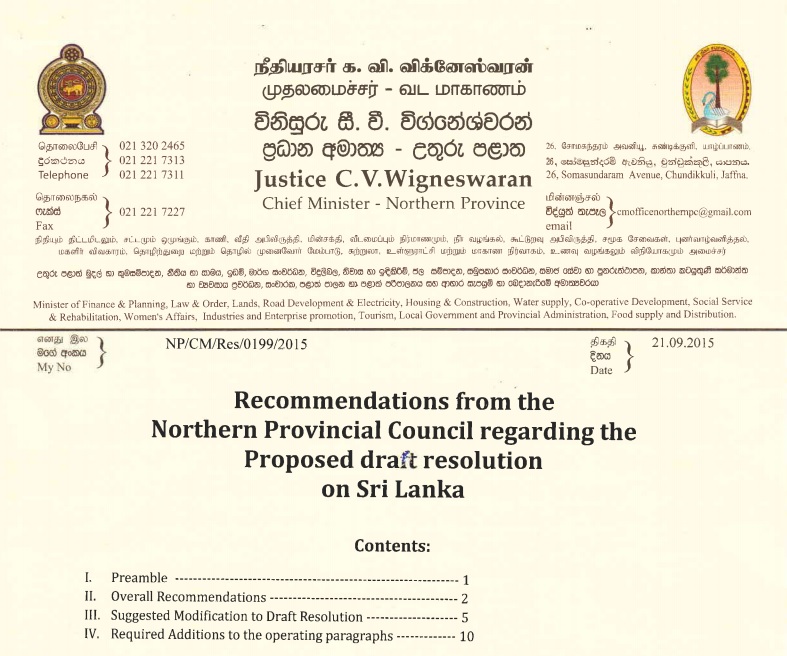 |
| Photograph: Tamil Guardian |
As the United Nations Human Rights Council discusses a resolution to take forward the recommendations of the damming UN report into Sri Lanka’s atrocities, the chief minister of the Northern Provincial Council and former supreme court justice of Sri Lanka CV Wigneswaran called on the council to work for a resolution that fully adopted the recommendations of the High Commissioner for Human rights and allowed a victim centred transnational approach to the accountability and reconciliation process.
In a guidance note addressed to drafters of the upcoming consensus resolution on Sri Lanka and to member states of the UN Human Rights Council, Mr Wigneswaran spoke on 5 themes that would need to be sufficiently addressed in any resolution adopted by the council to see a lasting peace, accountability and reconciliation in Sri Lanka.
Extracts reproduced below:
Scope and Breadth of violations
As such, this Council strongly believes that Sri Lanka’s breach of the international obligations through the committing of international wrongful acts warrants the establishment of a mechanism, which draws the involvement of international judges and processes of high international standards to tackle ‘international crimes.'
The diverse nature of affected parties & offending individuals
It is vital to note that a significant proportion of its victims are scattered around the world including many thousands still languishing in refugee camps in India. Furthermore it must be noted that these diaspora victims played a vital role in providing evidence to the OISL investigation due to the non-co-operation of the previous Sri Lankan regime and systematic intimidation and threats potential survivors and witnesses to Human Rights violations were subjected to within Sri Lanka.
Therefore any mechanism for achieving accountability and justice require transnational arrangements via the United Nations, especially in the context of states which do not adhere to universal jurisdiction and/or enabling domestic legislation towards addressing ‘international crimes’, to request the surrender of suspects in third states.
The Time Frame in delivering accountability, justice and reconciliation
While we share the hopes and aspirations as all communities, as the community which was frequently at the receiving end of the political reversals within Sri Lanka we wish to strongly emphasize the need to impress upon Sri Lanka the need to adapt a time bound action plan towards accountability. Furthermore, we wish to emphasize while the new government and its stated pronouncements are a welcome development, our own collective memory, experience and the lessons from other contemporary examples such as Myanmar reinforce the need for the international community not to be complacent with regime changes as long entrenched structural causes of the protracted conflict of not disappear overnight and may in fact continue to impact well into the future.
The methods of achieving accountability justice and reconciliation,
“International community must bear greater responsibility towards implementing alternative mechanisms to expedite the process of accountability and justice by adopting context specific international principles and best practises including international judges and process of international standard.
Need for addressing the structural cause of the conflict
In this regard the full implementation of the 13th amendment in the original spirit and word as it was intended in the Indo-Lanka accord and the issues highlighted in the letter submitted by then Tamil United Front Leaders (TULF) on 28 October l9B7 to the Indian Prime Minister, is a vital first step towards evolving a more comprehensive and meaningful devolution through constitutional reforms.
Need for Victim centred approach
In this regard the recommendations of UN Special Rapporteur on the promotion of truth, justice, reparation and guarantees of non-recurrence Pablo de Greiff on Sri Lanka should be adhered to. Such mechanisms should be set up with the assistance of the International Community preferably through an internationally supervised process taking into account that many victims are based in nations outside of Sri Lanka.
Issue of Amnesty
In this backdrop taken into consideration the gravity of allegations facing the perpetrators, lessons from other international examples and the Rome Statute of the International Criminal Court we wish to strongly advise against any moves towards affording amnesty to those who bear the responsibility for violations which fall into the category of 'international Crimes'. Furthermore if non-recurrence of mass atrocities and the creation of a new human rights culture is of prime motivation it is vital that the cycle of impunity is brought to an end through effective prosecution of those who are accused of international crimes'. It is the least we could do to the Victims.
We need your support
Sri Lanka is one of the most dangerous places in the world to be a journalist. Tamil journalists are particularly at threat, with at least 41 media workers known to have been killed by the Sri Lankan state or its paramilitaries during and after the armed conflict.
Despite the risks, our team on the ground remain committed to providing detailed and accurate reporting of developments in the Tamil homeland, across the island and around the world, as well as providing expert analysis and insight from the Tamil point of view
We need your support in keeping our journalism going. Support our work today.
For more ways to donate visit https://donate.tamilguardian.com.

